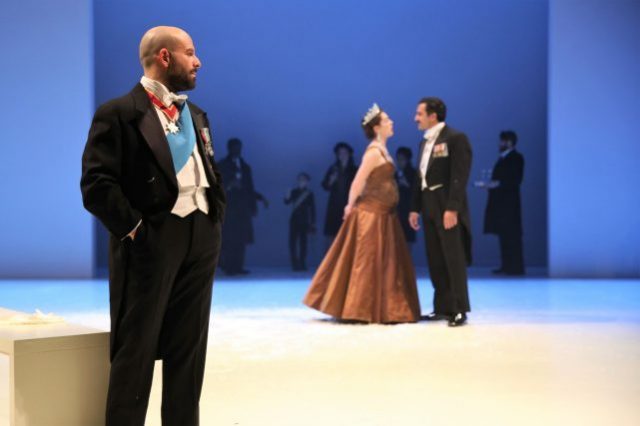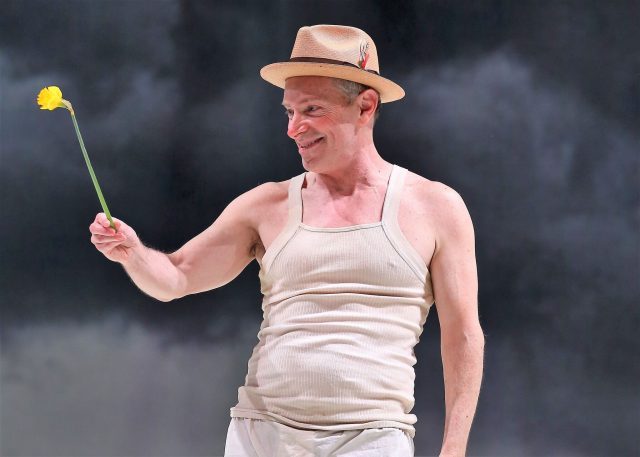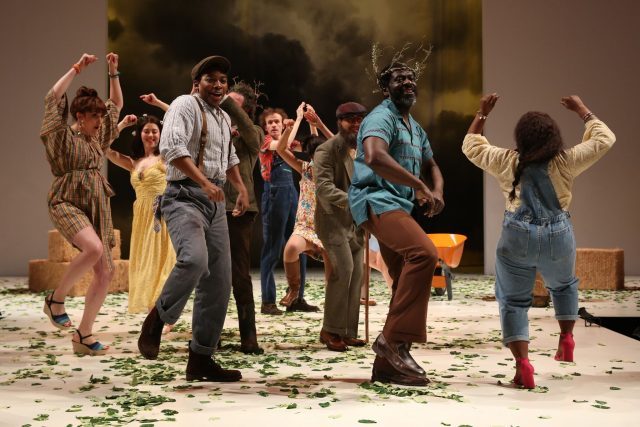
Leontes (Anatol Yusef) grows suspicious of Hermione (Kelley Curran) and Polixenes (Dion Mucciacito) in The Winter’s Tale at TFANA (photo by Carol Rosegg)
Theatre for a New Audience, Polonsky Shakespeare Center
262 Ashland Pl. between Lafayette Ave. & Fulton St.
Tuesday – Sunday through April 15, $90-$125
866-811-4111
www.tfana.org
Theatre for a New Audience resident director Arin Arbus approaches William Shakespeare’s The Winter’s Tale — a tragicomedy and late romance that is considered one of the Bard’s problem plays — with sharp teeth and claws bared, like a grizzly bear just awakened from hibernation. In fact, a bear — well, a man in a bear suit (Arnie Burton) — is a key character in the nearly three-hour production, which opened Sunday night at the Polonsky Shakespeare Center in Fort Greene. The bear, who lives under the stage, impacts the narrative in each of the very different two acts, which are famously separated by a sixteen-year gap in the story, another kind of hibernation. With snow falling in Sicilia, King Leontes (Anatol Yusef) is hosting Polixenes (Dion Mucciacito), the king of Bohemia, When Polixenes considers leaving for home, Leontes suddenly, and without reason, becomes convinced that his pregnant wife, Hermione (Kelley Curran), and the Bohemian leader are in love and have made a cuckold of him. Leontes’s trusted friend, Camillo (Michael Rogers), assures the king that no such treachery has occurred, but the king refuses to listen to him, declaring, “Is whispering nothing? / Is leaning cheek to cheek? Is meeting noses? / Kissing with inside lip? Stopping the career / Of laughter with a sigh? — a note infallible / Of breaking honesty. Horsing foot on foot? / Skulking in corners? Wishing clocks more swift? / Hours minutes? Noon midnight? And all eyes / Blind with the pin and web but theirs, theirs only, / That would unseen be wicked? Is this nothing? Why, then the world and all that’s in ’t is nothing, / The covering sky is nothing, Bohemia nothing, / My wife is nothing, nor nothing have these nothings, / If this be nothing.” In accusing his wife, the king has also deeply troubled their young son, Maximillius (Eli Rayman). Leontes orders Camillo to kill Polixenes, but instead Camillo flees to Bohemia with him. In prison, Hermione gives birth to a girl, and Leontes tells Lord Antigonus (Oberon K. A. Adjepong), the husband of Hermione’s dedicated lady-in-waiting, Paulina (Mahira Kakkar), to take the baby away and abandon it. After heartbreaking tragedy, the baby is found on the shores of Bohemia by a shepherd (John Keating) and his clownish son (Ed Malone), who bring the infant, whom they name Perdita, home.

Autolycus (Arnie Burton) offers a phallic flower in Arin Arbus’s latest Shakespeare adaptation (photo by Carol Rosegg)
After intermission, the dire, dour mood changes dramatically. Father Time (Robert Langdon Lloyd) walks with a cane onto the stage as green leaves fall in Bohemia, announcing spring. Time, representing the chorus, explains that sixteen years have passed, filling in the details of what has become of the main characters. Most important, Perdita (Nicole Rodenburg) is now a teenager who is close with Florizel (Eddie Ray Jackson), the son of Polixenes, although no one knows her true lineage. As the region prepares for a sheep-shearing feast, Autolycus (Burton), a former servant of Florizel’s who has gone rogue, picks a few pockets, including that of an audience member in the first row. “Ha, ha, what a fool Honesty is! And Trust, / his sworn brother, a very simple gentleman! I have sold all my trumpery,” Autolycus, who serves as the play’s turning point, admits. Through a series of events, everyone winds up back in Sicilia, where a little bit of magic eases much, but not all, of the pain that spread through the first act and the bitterness of winter turns into the hopeful blossoming of spring as time marches ever forward.

Bohemians celebrate at the sheep-shearing fest (photo by Carol Rosegg)
Arbus (King Lear, The Skin of Our Teeth) juggles the play’s so-called problems deftly, balancing the darkly serious with the lightly comic, moving things relatively briskly on Riccardo Hernandez’s spare but austere, at times almost blindingly white set, which features a large arch in the back, behind which projections change from ominous clouds to blue skies. Emily Rebholz’s contemporary costumes take some getting used to, although they do shift from dignified black, white, and brown in the first act to a more casual look with splashes of color in the second. Much of the cast, which also includes Maechi Aharanwa as Mopsa, Liz Wisan as Dorcas, cellist Zsaz Rutkowski, and multi-instrumentalist Titus Tompkins, is allowed a wide berth, especially during the wacky sheep-shearing festival, but Curran (Present Laughter, Sense & Sensibility), Rogers (The Call, Sucker Punch), and RSC vet Yusef (Hamlet, Boardwalk Empire) keep it grounded just enough. The Winter’s Tale might be a lesser-performed Bard work, but it still has its gems. “If powers divine / Behold our human actions, as they do, / I doubt not then but innocence shall make / False accusation blush and tyranny / Tremble at patience,” Hermione says, speaking for all truths. And of course, the play also boasts perhaps Shakespeare’s most famous stage direction: “He exits, pursued by a bear.”